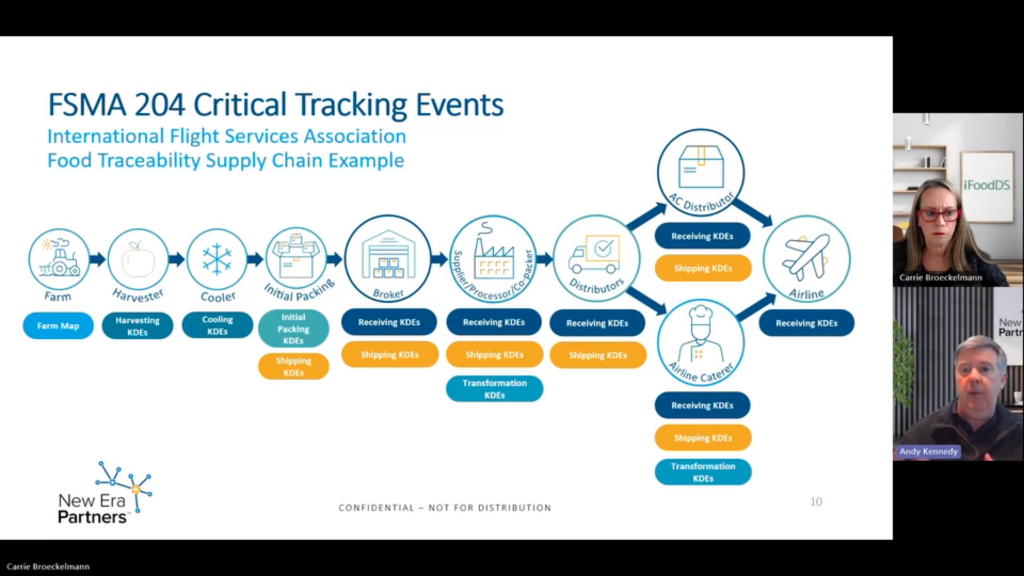First of Three Exclusive IFSA Webinars Takes Deep-Dive Into FSMA 204
Share

Last week, the International Flight Services Association (IFSA) completed a series of three webinars focused on helping active members understand and comply with FSMA 204, the US Food and Drug Administration’s (FDA) incoming Food Traceability rule.
The rule, a final version of which was published in November 2022 and that comes into force on January 20, 2026, requires persons who manufacture, process, pack, or hold foods on the Food Traceability List (FTL) to maintain and provide supply chain partners with key data elements (KDEs) on the receipt, transformation of and shipping of items at certain critical tracking events (CTEs) across the food’s multi-layered journey, from harvesting through to delivery to an airline.
Each of the three webinars were presented by Andrew Kennedy, Principal Traceability Advisor at New Era Partners, which provides personalized traceability and compliance consulting; and Carrie Broecklemann, Director of Enterprise Accounts at food safety consulting practice iFoodDS. The flow of the webinars followed New Era Partners’ “Learn, Plan, Do, Review” methodology.
The first provided viewers with critical information about FSMA 204. Early in the webinar, Kennedy stated that the goal of FSMA 204 and its new record-keeping requirements, which include the ability to provide the FDA with an electronically sortable spreadsheet within 24 hours, is to “to speed up outbreak investigations [of foodborne illness] down from an average of 35 days to five or six days,” as well as to assist in product recalls or other threats to public health.
During the hour-long session, Kennedy and Broeckelmann reviewed the Food Traceability List, which includes foods with the greatest risk to public health. The FDA identifies these as, among others, certain fruit and vegetables, eggs, nut butters and shellfish.

The KDES that need to be accounted for vary across different parts of the food’s journey (or CTEs) from harvesting, cooling and initial packaging through to delivery to the airline caterer and then the airline. Kennedy explained that in the case of shipping and receiving, suppliers likely already have six of the eight elements required, such as the “Ship From” address (as long as it’s a specific location rather than the company headquarters) and “Ship To” location, “Product Description” and “Quantity & Unit of Measure.” However, he also highlighted the need to log two new KDEs: the Traceability Lot Code and Traceability Lot Code Source or Reference.
The presenters went on to discuss the nuances of the rule too, outlining the differences in CTEs for different food sources on the Food Traceability List, such as those harvested from a farm or aquaculture farm versus for wild-caught seafood, and also talked about industry-specific nuances, including how to list the “ship to location” when it is an aircraft rather than a physical address.
The second half of the webinar was spent running through Kennedy’s custom-designed spreadsheets and forms for use by IFSA members, which give suppliers simple ways to carry out tasks such as evaluating their current systems in relation to the requirements of FSMA 204, determining fellow suppliers’ data-sharing capacity and conducting gap analysis.
Kennedy confirmed that airline caterers can hold FSMA 204-related records on behalf of their airline clients, and shared a further spreadsheet to help suppliers keep a log of customer requirements, whether that’s an airline or retail partner.
The full Powerpoint presentation and each of the tools shared by Kennedy are available for viewing and download free of charge at dedicated member’s only page on the IFSA website.
If you do not yet have an account created for IFSA’s member-only website, please click here for directions on how to create your account. If you have any issues creating or accessing your account, please email info@ifsa.aero.
Click here to renew your IFSA membership and gain access to the webinar and accompanying materials.


